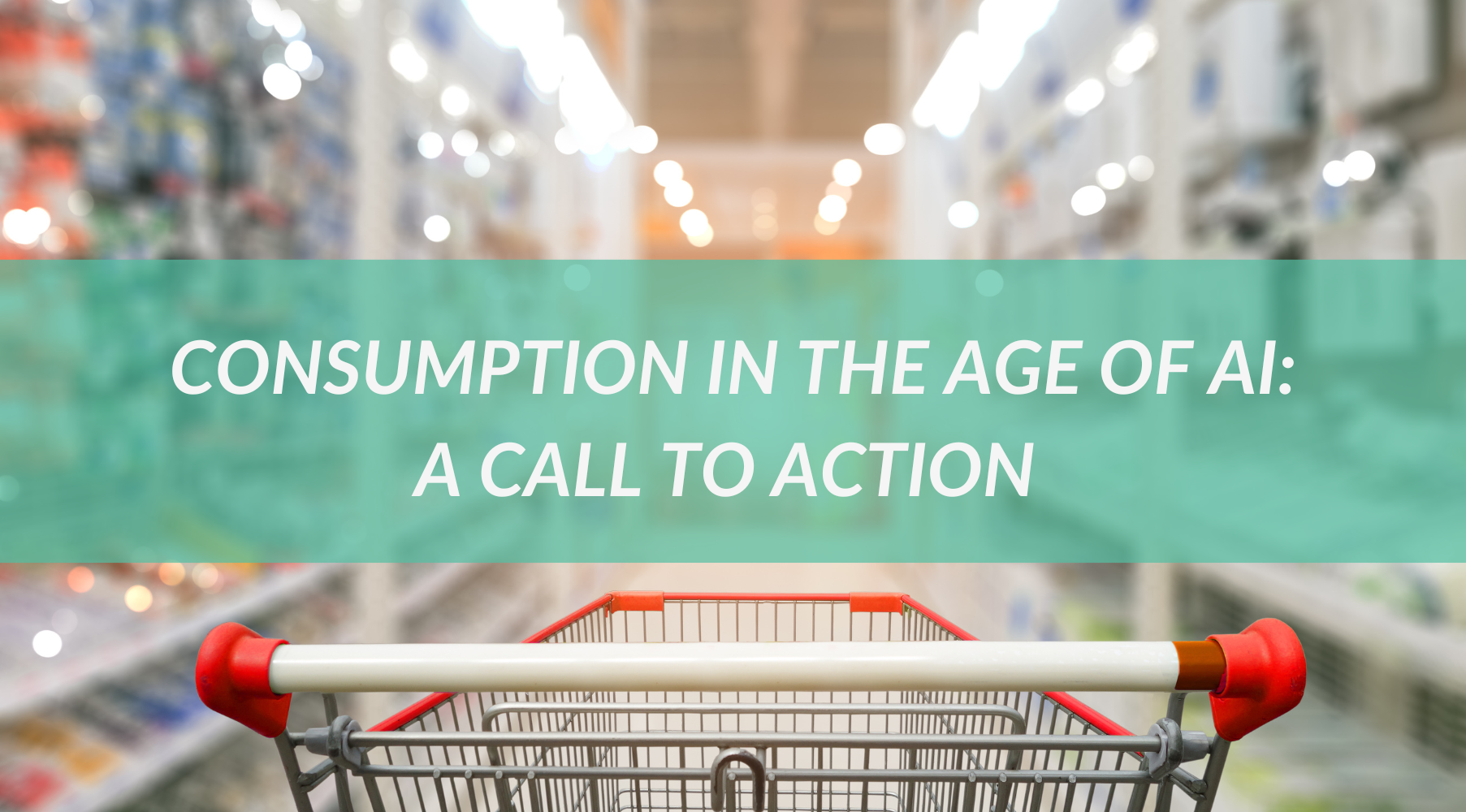Aug 21, 2023 Strategic Buying and Consumption in the Age of AI: A Call to Action
By Ben Heller
Even if you've been living underneath a rock for the past year, you're bound to have heard about artificial intelligence (AI) and the transformative impact it's projected to have on our world. There’s also a good chance you’re sweating, or in flood zones, or both, as the world has experienced some of the most erratic weather on record recently. Predictions on AI and climate change seem to focus on the extreme doom and gloom as these narratives generate more clicks… but even if you’re an optimist, we can agree that both these things will have a profound effect on humanity.
We can’t count on companies or governments to work together to do the right thing for humanity. Companies are optimized to profit. Governments exist to protect the common good, but policy making is slow to react to the pace of modern change.
As conscientious humans, we care about what happens to humanity. We know that we are in this together and want to do the right thing. We also want to have some level of personal control over these issues – huge as they may be. In my opinion, one of the most impactful ways to exert influence is in the form of how and what we consume.
Early lessons in being an educated consumer
I learned how to be a good consumer from my Dad. Growing up, there wasn’t a toilet in our house that didn’t have a  Consumer Reports magazine on top of it. When I was 11, I loved music, and wanted to buy a great Walkman. My Dad showed me what a spreadsheet was, opened up Lotus 123, and he taught me how to make a matrix. We listed all the relevant criteria (auto reverse, dolby, graphic equalizers, size, weight, sound quality, etc.), assigning weights to each criteria. I went to the store, tried them out, and scored each component, adding them up. The Panasonic scored higher, so that’s the one I picked. I loved that Walkman for years and learned strategic sourcing in the process. Working in supply chain and strategic sourcing for over a decade, that same process is the basis of how strategic sourcing organizations work.
Consumer Reports magazine on top of it. When I was 11, I loved music, and wanted to buy a great Walkman. My Dad showed me what a spreadsheet was, opened up Lotus 123, and he taught me how to make a matrix. We listed all the relevant criteria (auto reverse, dolby, graphic equalizers, size, weight, sound quality, etc.), assigning weights to each criteria. I went to the store, tried them out, and scored each component, adding them up. The Panasonic scored higher, so that’s the one I picked. I loved that Walkman for years and learned strategic sourcing in the process. Working in supply chain and strategic sourcing for over a decade, that same process is the basis of how strategic sourcing organizations work.
Fast forward to today and contrast that process with how I buy things as an everyday consumer. I don’t choose to utilize mental energy on making most buying decisions. What’s the lowest cost? Is it good enough to solve my problem? Great. Done.
Put your money where your values are
It takes “Stage 2” thinking that is slower and more logical to look at things strategically. In his book, “Thinking Fast and Slow”, Daniel Kahneman talks about “Stage 1” thinking as being intuitive and emotional. As consumers, it’s easy to make decisions based on what gives us immediate pleasure or presents the cheapest solution to the problem.
But without going further in our thought processes, we risk buying things that are misaligned with our values. And that becomes even more important in an age when our decisions are going to be more and more influenced by AI. As a conscious consumer, what is it worth to ensure that the product you purchased doesn’t utilize slave labor, or poison people, or isn’t damaging our environment. These types of things can be challenging to think through, especially without some kind of scoreboard to help us make decisions.
 Within strategic corporate environments, even when we’re aware of the downstream differences, we don’t have a great track record of buying with our values. According to Santa Fe’s Environmental, Social, and Governance (ESG) report, 77% of companies now have programs supportive of environmental sustainability, however, a mere 2% of corporate procurement processes meaningfully incorporate environmental sustainability as a material criteria in their buying. I see many people discussing the importance of ESG, but until we reward those companies that choose to invest in environmental and sustainable practices with our business, progress will be slow.
Within strategic corporate environments, even when we’re aware of the downstream differences, we don’t have a great track record of buying with our values. According to Santa Fe’s Environmental, Social, and Governance (ESG) report, 77% of companies now have programs supportive of environmental sustainability, however, a mere 2% of corporate procurement processes meaningfully incorporate environmental sustainability as a material criteria in their buying. I see many people discussing the importance of ESG, but until we reward those companies that choose to invest in environmental and sustainable practices with our business, progress will be slow.
Those of us who have shelter, aren’t hungry, have clothing, have support and love – we can afford be better about how we consume. With unprecedented access to data enabling more informed choices, there are opportunities to align our purchases with our values. I’m going to start “thinking slow” regarding my purchasing decisions, and support those that make a meaningful impact in ESG, who don’t use slave labor, treat employees fairly, and are aligned with my social values including equal rights for all and hate toward none. I hope you’ll join me.
If you are in procurement, strategic sourcing, category management, or make mobility purchasing decisions, I’d love to hear where you see companies doing this exceptionally well. It pains me to say that supply chain management isn’t sexy… but if we can highlight those that are making a difference, and companies that are choosing to pay more to buy consciously, I’d love to see the world support you.
CEO Ben fell in love with the mobility industry while running Accentureʼs global mobility consulting practice. Focusing on the mobility supply chain, he learned the hard way that move pricing is complicated, unclear, and vulnerable to manipulation. After evaluating all existing alternatives, Ben partnered with Ryan to make data-driven moving decisions possible.

